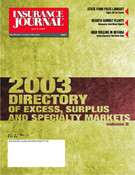What have you done in the last six months? Former Louisiana Commissioner Jim Brown lost 28 pounds, read 100 books, cooked for hundreds of people daily and squeezed in a weekly World Wide Web column between two book projects. Of course, he did it all during a six-month stint in federal prison, after having been convicted on seven charges related to lying to an FBI agent. He was acquitted of charges of fixing the liquidation of Shreveport, La.-based Cascade Insurance Co. on terms favorable to its owner.
During the trial, Brown’s lawyers asked for the FBI agent’s notes to be admitted into evidence, suggesting the notes would prove Brown’s side of the story, but the judge would not allow it. Now Brown, released April 11, said he’s pursuing a new trial based on that and other evidence. He took time from his post-prison consulting schedule to talk with Insurance Journal staff writer Kevin B. O’Reilly.
IJ: What have you been up to since your release from prison?
JB: I’ve been home in Baton Rouge doing the same stuff I was doing before my six-month sabbatical. If you have to go away for two or three years, you have to give up a lot of projects and commitments. But for only six months, that’s such a short time that I’ve tried to hang on to a number of projects I’ve been involved in. But I’ve got to catch up. I have a six-month backlog. There are 500 letters I haven’t had a chance to open up yet, and 5,000 e-mails that I haven’t been able to acknowledge.
IJ: What kind of projects have you been involved in?
JB: I’ve been getting calls from people throughout the country who have state concerns in Louisiana. And until three weeks ago I was the third most senior insurance commissioner in the country. I’ve been doing a lot with regard to surplus lines involving the international market, things involving Lloyd’s, and what’s going to happen in the next six months to a year.
So I’m spending a lot of time giving perspective on mostly national issues, such as the healthcare debate. Sen. John Breaux of [Louisiana’s plan] is one of the integral parts to the healthcare solution, and I share my perspective on Sen. Breaux’s approach. I offer some suggestions on what may work and what may not work. I also discuss surplus lines problems, post-9/11 what we’re going to be doing with alternatives in insurance.
I’ve been offered a number of business opportunities, particularly internationally. I’ve had offers to travel to several countries as their regulatory climates seem to be changing-India, Indonesia. Up until now, the state offered what limited insurance might be available. As they take a more private sector approach, someone like myself might be of help in doing that kind of thing.
I’ve also been doing a lot of speaking engagements, particularly for businessmen on how to keep out of trouble with the federal government. I’ve booked a speaking tour with the different insurance groups and associations. I’ve also written a book about everything that’s transpired, and I hope that it will be published late this summer. I’m two-thirds of the way through a book on the prison system about waste in prison, the lack of an effort to truly rehabilitate prisoners. So I’m speaking, consulting, writing. I’ve got a full agenda.
IJ: What’s the title of your book and what is it about?
JB: I Won’t Back Down is the working title, that’s from the Tom Petty song. It ends the day I entered prison. I’m still protesting strongly, and still asserting my innocence. I still have options by the way. I have six more months to ask for a new trial based on newly discovered evidence, and I will be looking at every single avenue available.
The second book is about how I dealt with prison life. Ninety percent of my companions were convicted drug felons-three percent Caucasians, 90 percent Black and five percent Latinos. How did I deal with that? I was offended as a taxpayer because there was no rehabilitation going on. I think that’s wrong. Prisoners were released without having any training, no education, no computer skills. Fifty percent of those who are released go back to prison again.
IJ: How do you feel you were wronged?
JB: There are a lot of serious questions raised about what I was supposed to have done, but I have to face the fact that I was convicted.
There have been jurors who came forth saying it was a tragedy I was convicted. In virtually every case where a public official was convicted, he benefited in some way. He was compromised by benefiting himself. Nobody ever accused me of taking a penny illegally. The fact that there’s no personal gain, that makes it more attractive for people to say, ‘Brown got a bum rap.’ I think there’s been some interest there.
I was convicted of making false statements to an FBI agent. I’m the first person in history of America convicted of making false statements. I could not see his notes, and we could not cross-examine him. No conviction ever allowed that before. After I was found guilty, now the handwritten notes have been released and confirm exactly what I said. The fellow flat-out lied. One of the jurors in my trial said if she’d seen the notes she would not have voted to convict.
IJ: Where were you imprisoned? How did you pass the time?
JB: I spent six months in federal prison in Oakdale, La., the center of the state. That was a blessing. Family and friends could easily visit with me. It was two hours away from anywhere in the state. Friday, Saturday and Sunday I would have 25 visitors come to see me. That helped tremendously. I was treated just like any other prisoner. I worked in the kitchen as a cook and I really liked it, quite frankly. I fixed a mean meat loaf. They loved my meat loaf in Oakdale. And I made my specialty, powdered-sugar doughnuts.
The experience was much more positive than I thought it would be. I worked out two hours every day, and lost 28 pounds when I was there. My body-fat ratio was 21 and now is 9.6. I read over 100 books when I was up there. I finished writing my one book, and started another book. I also wrote a column from prison, and every week I gave a book review. I got 500,000 hits on my Web site, jimbrownla.com.
I was the only lawyer, and almost the oldest inmate. I was the senior guy up there. I kind of hung out in the library every night from about 6 to 10 p.m. and I was available to talk to inmates about family problems or their legal cases. They would come to me for advice, ask me insurance questions or about what to do about real estate, buying a house. I helped show them how to deal with their problems while they’re in prison-how to keep up a relationship. I showed them the letters I wrote to my kids. You know, there are limited phone calls in prison. You get 300 minutes a month-that’s about eight and a half minutes a day. So I urged them to do the same thing. I believe I was a strong positive influence for a lot of those fellows.
IJ: Had any of your fellow inmates voted for you?
JB: A few of them did. Many of them were quite young, so they’d say, ‘My mom voted for you!’ I was asked for lots of autographs for parents. I served almost 12 years; I took office in 1991. I was re-elected three times and had a 56-count indictment come down three weeks before the election and I was still overwhelmingly re-elected.
IJ: What was the hardest thing about your time in prison?
JB: It’s nice to know people feel I was wronged. That makes a big difference. Particularly as it got toward the end to think, ‘How terrible it is what happened to me. My country let me down. I was wronged.’ I had to face the fact that I thought I made a good contribution to public life and had the rug pulled out from under me with false information. That idea, that fact, that sense I had to deal with it every day was the toughest thing about it.
IJ: Why do you think federal prosecutors spent so much time pursuing you?
JB: I got [in the] crossfire of the federal government wanting to get former Gov. [Edwin] Edwards at any cost. They told my lawyers that if I’d cooperate all my problems would go away. But I knew nothing to tell them.
IJ: Do you worry about how the Louisiana Insurance Department’s image may have been tarnished by your conviction? When the LDI was shutting down Patterson Insurance Co. for insolvency, its CEO pointed to your conviction as part of a culture of corruption and political witch hunts at the department.
JB: My department has always been certified and accredited by the NAIC. And in spite of what happened to me, it still has a solid reputation. Anytime we shut down a company, they scream fraud or political connections. There’s never been an incident where we shut down or took over a company where a higher court has overruled our decision. They hire big lawyers but no court has ever second-guessed the decision of the department. The principals who know they’ve got liability and criminal exposure are worried. The good news is no court has ever upheld that position.
As far as in Louisiana, there are no other people criticizing the department. The top 30 or 40 people in the department were trained by me, put in place by me. I’ve heard nothing like that, when I was there up until the time of my conviction.
IJ: What’s your view of the push to change Louisiana’s ratings board (whose members are appointed by the governor) to an appellate board and give insurers more rate flexibility?
JB: It can work good either way. I don’t see it as a big problem. Anytime a company had a legitimate concern about the rates we’d listen. You could make a pretty good case that having the governor involved can put some checks and balances in there. You can use the governor to write letters to ask companies to do business in the state. [Changing the ratings board] is not going to make a lot of difference one way or the other.
Louisiana has the same problem most Gulf states have-hurricane exposure. You’re not going to overnight attract new companies that have the same exposure they had before. We need a state catastrophic fund, but we’re not big enough to put up the money ourselves.
IJ: Can you talk about your consulting work on surplus lines?
JB: I used to be the chairman of surplus lines task force at NAIC, and I got to know a number of the surplus lines associations, groups and companies then, primarily out of London and throughout Europe. They are now looking more to the U.S. in terms of business opportunities. They want to come into the U.S. and be competitive. Concerns about Lloyd’s caused regulators to put firm restrictions and high, high trust fund requirements on surplus lines-the amount of collateral alien reinsurers have to keep on hand in New York banks is a big issue. It may now be time to loosen up those restrictions and requirements. There are groups approaching me on advising them about whether it’s prudent to loosen up those restrictions.
IJ: What are your plans for the future?
JB: My top priority is spending a lot of lost time with my family. I’ve been hitting my golf ball-I want to get my seven iron down a little better. I play a lot of golf with my grandson. I support the varied interests of my grandchildren; I’m just sharing their lives. My oldest daughter is a White House correspondent for NBC news, Campbell Brown. I’m anxious to spend a lot of time with my new grandchild. Between the trial and all the pressures of what happened to me, I have a lot of catching up to do.
Getting a new trial is something my lawyers are looking into now. It’s several months away. Because I’m innocent and was unjustly convicted, I will go down every single avenue to clear my name. … I’d like to think my 30-year legacy in public life, where I touched lives of thousands of people, is not tainted by a misunderstanding or direct setup in a 30-minute interview. That just seems so unfair. I’d like to think I left a better legacy than that. But I’m not going away anytime soon. I’ll still be very active in insurance issues for a while to come.
Topics Excess Surplus Louisiana
Was this article valuable?
Here are more articles you may enjoy.


 Allstate CEO Wilson Takes on Affordability Issue During Earnings Call
Allstate CEO Wilson Takes on Affordability Issue During Earnings Call  Longtime Alabama Dentist Charged With Insurance Fraud in 2025 Office Explosion
Longtime Alabama Dentist Charged With Insurance Fraud in 2025 Office Explosion  Chubb Posts Record Q4 and Full Year P/C Underwriting Income, Combined Ratio
Chubb Posts Record Q4 and Full Year P/C Underwriting Income, Combined Ratio  India’s GIFT City Attracts Lloyd’s and Other Global Reinsurers, Sources Say
India’s GIFT City Attracts Lloyd’s and Other Global Reinsurers, Sources Say 


